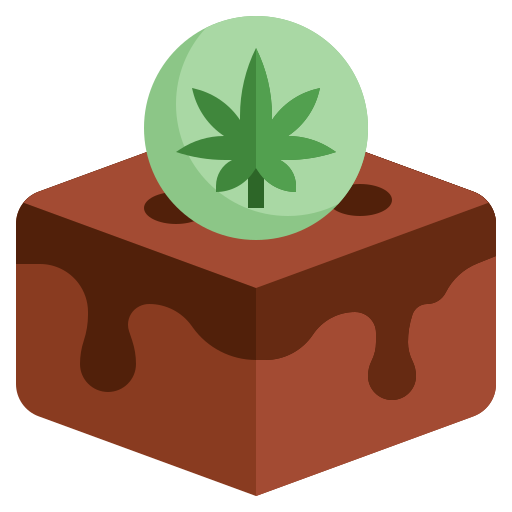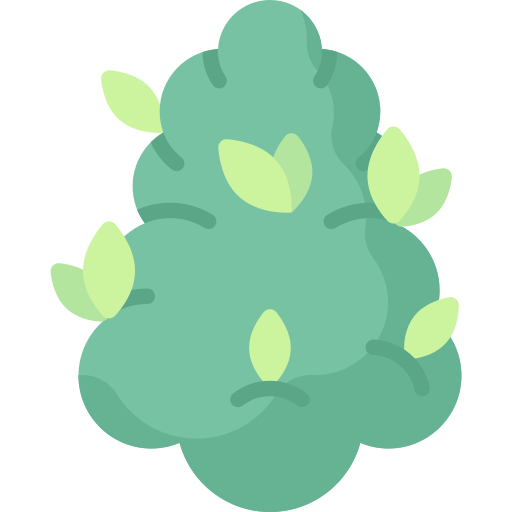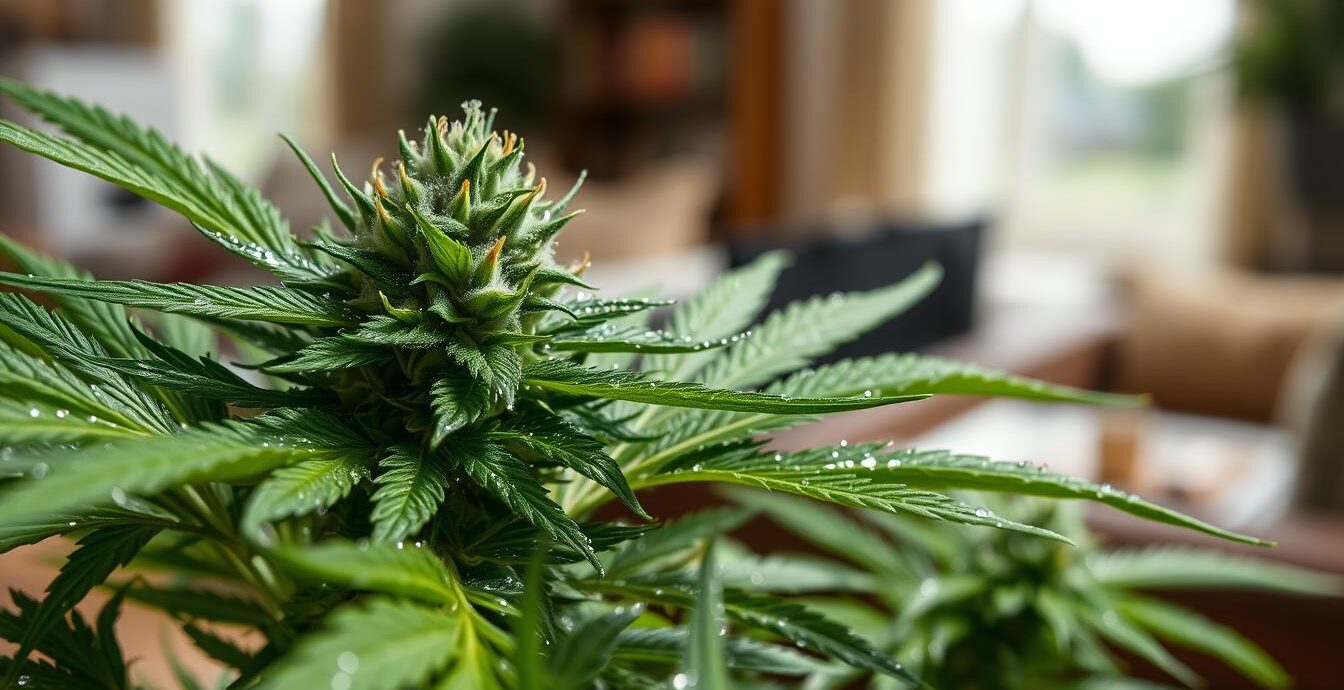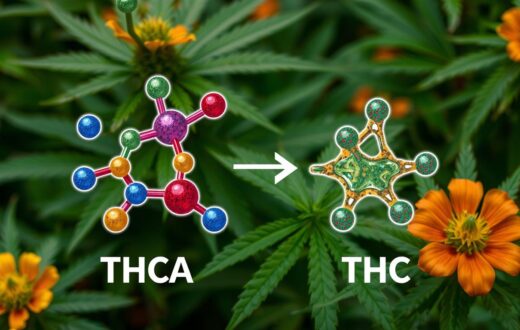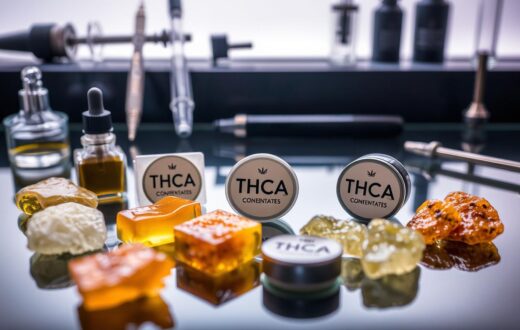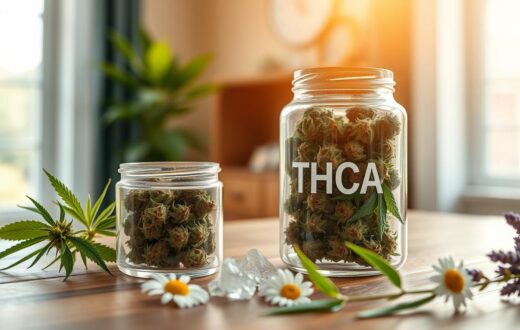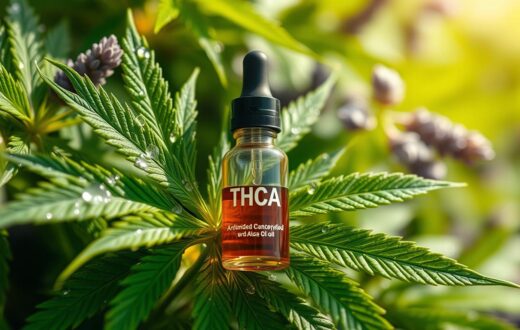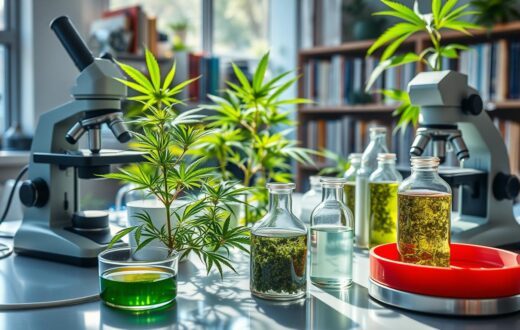Have you ever thought about the hidden power of raw cannabis? THCA, a non-psychoactive compound found in fresh cannabis, is making waves in the medical field. It’s a hidden gem in the cannabis world, promising health benefits without the psychoactive effects.
THCA stands for tetrahydrocannabinolic acid, the precursor to THC, the compound that gets you high. But unlike THC, THCA doesn’t cause intoxication when consumed raw. It’s gaining attention for its potential health benefits.
Studies suggest THCA has anti-inflammatory and neuroprotective qualities. This is exciting because chronic inflammation is linked to many diseases in the US. Could THCA be a natural solution to these health issues?
As we dive into THCA, we’ll look at its effects, benefits, and healing properties. From its role in the cannabis plant to its medical uses, THCA is a fascinating topic. Let’s explore how this remarkable cannabinoid could impact our health and wellness.
What is THCA?
THCA stands for tetrahydrocannabinolic acid. It’s a key compound found in raw cannabis plants. This non-psychoactive cannabinoid is found in fresh cannabis buds and leaves. It has gained attention for its potential health benefits.
Definition and Chemical Structure
THCA is a precursor to THC, the well-known psychoactive component of cannabis. It has a similar structure to THC but includes an extra carboxylic acid group. This difference is key, as it prevents THCA from causing the “high” associated with THC.
Natural Occurrence in Cannabis
Both marijuana and hemp plants naturally produce THCA. Hemp, by legal definition, contains less than 0.3% THC. The enzyme THCA-synthase plays a vital role in converting CBGA to THCA within the cannabis plant.
How THCA Differs from THC
The main difference between THCA and THC lies in their effects on the body. THC binds to CB1 receptors in the brain, causing psychoactive effects. THCA does not. Instead, THCA offers potential wellness benefits without the intoxicating impact. This unique property has sparked interest in THCA’s potential therapeutic uses and medical applications.
The Role of THCA in Cannabis Plants
THCA is very important in cannabis plants. It’s not psychoactive but turns into THC, which gives the plant its high. Studies suggest it could help with inflammation and nausea, linking it to wellness.
THCA Production During Growth
Cannabis plants make THCA in their trichomes. It starts with CBGA, known as the “mother of all cannabinoids.” An enzyme called THCA synthase changes CBGA into THCA. This change is key for the plant’s growth and health benefits.
Environmental Factors Affecting THCA Levels
Many things can change how much THCA is in cannabis plants. Sunlight is a big one. More sun can turn some THCA into THC over time. Things like temperature, humidity, and soil quality also play a part.
Growers need to control these factors to get more THCA for health benefits. Fresh plants have more THCA than dried ones. So, how and when you harvest and store is very important.
Potential Therapeutic Effects of THCA
THCA benefits are getting noticed by doctors. This part of raw cannabis might help in many health areas. Studies show it could change how we treat diseases.
Anti-Inflammatory Properties
THCA could fight inflammation. This is great news for those with arthritis or inflammatory bowel disease. It might help without making you feel high.
Neuroprotective Benefits
THCA might shield nerve cells from harm. This could be a big win for Parkinson’s or Alzheimer’s patients. Early studies look promising for brain health.
Effects on Nausea and Appetite
THCA might ease nausea and vomiting, especially for chemo patients. It could also help people eat more when they’re sick. These benefits could greatly improve life for many.
THCA’s potential goes beyond that. It might help with weight and protect cells from stress. Most studies are on animals, but the results are encouraging. As research goes on, we might find even more ways THCA can help.
The Relationship Between THCA and THC
THCA and THC are two important cannabinoids found in cannabis plants. THCA makes up about half of the non-psychoactive cannabinoids in most raw cannabis strains. Unlike THC, THCA doesn’t cause a “high” when consumed raw.
This difference comes from their unique chemical structures and how they interact with our bodies.
Conversion Process During Heating
When cannabis is heated, THCA turns into THC through decarboxylation. This process removes the carboxylic acid group from THCA, making it psychoactive THC. This is why eating raw cannabis won’t get you high, but smoking or vaping it will.
The heat from these methods triggers the conversion, unleashing the thca effects many users seek.
The Impact of Decarboxylation
Decarboxylation is key for both recreational and medicinal cannabis users. It changes the potency and effects of cannabis products. Heating is the most efficient method, but light and air can also cause slow decarboxylation over time.
This is why proper storage of thca and cannabis products is important to maintain their intended effects.
Understanding the relationship between THCA and THC helps users make informed choices about consumption methods. Raw or minimally processed cannabis products have higher THCA levels. Heated products have more THC.
The legal status of these compounds can vary. THCA is often legal because it’s non-psychoactive, while THC is frequently regulated or controlled.
How THCA Affects the Body
THCA works differently in our bodies, offering wellness benefits without the high. It interacts with our system in unique ways, unlike THC. Let’s look at how THCA affects us and its potential benefits.
Interaction with Endocannabinoid System
THCA connects with our endocannabinoid system but doesn’t bind to CB1 receptors like THC. This is why it doesn’t cause psychoactive effects. Instead, it might affect other wellness and balance processes.
Potential Benefits for Pain Management
Research shows THCA could have anti-inflammatory effects, helping with pain. Users say it relieves joint and muscle pain. More studies are needed, but these findings suggest THCA could help with chronic pain.
Effects on Sleep Disorders
THCA might also improve sleep quality. Users report better sleep with THCA-rich products. Its relaxation properties could be why, without THC’s intoxicating effects. Yet, more research is essential to fully grasp THCA’s sleep benefits.
Common Methods of Consumption for THCA
THCA and cannabis fans have many ways to enjoy its benefits. Let’s look at some popular methods to experience THCA’s effects.
Raw Cannabis Juicing
Raw cannabis juicing is a top choice for THCA lovers. It keeps up to 40% THCA in the plant. People mix raw cannabis leaves with fruits or veggies for a healthy drink.
Juicing lets you enjoy THCA’s benefits, like anti-inflammatory effects. But, it avoids the high THC can cause.
THCA-Dominant Edibles
THCA-rich edibles are easy to use. You can find them in smoothies, salads, or oils. Some products are even THCA gummies or capsules.
But, remember to keep these products cool. Heat can turn THCA into THC, losing its benefits.
Vaporization Techniques
Vaping THCA flower at low temperatures is a good choice. It keeps THCA intact and avoids THC conversion. This method lets THCA quickly enter your body through your lungs.
To vape THCA well, keep the temperature below 315°F (157°C). This way, you avoid losing THCA to THC. THCA flower can have up to 40% THCA, offering a strong dose compared to THC products.
Each method has its own THCA effects and how fast they start. Try different ways to see what works best for you. Always start small to see how your body reacts to THCA and cannabis.
Legal Status of THCA in the United States
The legal scene for THCA and cannabis in the U.S. is complex. THCA doesn’t get you high when it’s raw. This is key to its legal standing. The 2018 Farm Bill made hemp-derived THCA legal at the federal level. This is true as long as the delta-9 THC is 0.3% or less by dry weight.
Federal Regulations and Guidelines
At the federal level, THCA’s legality depends on its source and if it can turn into delta-9 THC. The Controlled Substances Act (CSA) lists tetrahydrocannabinols, including THCA, as Schedule I substances. This creates a gray area for THCA from cannabis, as it can turn into delta-9 THC. The DEA is thinking about changing cannabis to Schedule III, which could change THCA’s status.
State Laws Regarding THCA
State laws on THCA are all over the place. Some states like California, Florida, and Texas allow THCA products. But, places like Idaho and Louisiana say they’re illegal. In states like Arizona and Michigan, THCA’s legal status is unclear.
The legality often depends on how local laws interpret state and hemp laws. For instance, Alabama, Alaska, and Georgia allow THCA but with different rules. Texas has over 7,700 registered retailers of hemp products, showing the market’s growth despite legal doubts.
People need to know both federal and state laws about THCA and cannabis products. The legal status of THCA is changing, with ongoing debates and possible rule changes. This situation requires careful steps for both users and businesses in the THCA market.
Scientific Research on THCA Effects
The scientific world is exploring THCA’s medical uses. Studies show it could be very helpful. This part of cannabis doesn’t get you high but has special benefits.
Overview of Recent Studies
Research on THCA is just starting, with most on animals. It seems to reduce inflammation and help with nausea. One study found it might help with Alzheimer’s by improving brain function.
Emerging Findings and Future Research
THCA might protect cells from damage. It could help with metabolic issues and weight loss. But, we need more studies on humans to be sure.
As cannabis use grows, making sure products are safe is key. Look for products from trusted sources. Start with small amounts to see how you react.
User Experiences with THCA
THCA effects vary among users, with many reporting therapeutic benefits without feeling high. People share stories of pain relief, reduced inflammation, and better sleep. These experiences highlight the potential of THCA and wellness connections.
Anecdotal Evidence and Testimonials
Users often praise THCA for its gentle impact. Some find it helps manage nausea and improves appetite. Others note enhanced relaxation without mental fog. A common theme is the absence of THC’s psychoactive effects.
This makes THCA appealing for those seeking relief while staying clear-headed.
Differences Between THCA and THC Experiences
THCA users report distinct experiences compared to THC. They don’t feel “high” or impaired. Instead, they describe subtle benefits like reduced pain or improved focus.
This contrasts with THC’s known euphoric effects. THCA’s non-psychoactive nature allows users to maintain daily routines. It’s worth noting that individual responses can differ. Some users might experience mild side effects like nausea.
As always, consulting a healthcare professional before trying THCA is wise.
Comparing THCA with Other Cannabinoids
Cannabis plants have many compounds, each with its own effects. THCA is special because of its unique benefits. Let’s see how THCA compares to CBD and CBN.
THCA vs. CBD: A Comprehensive Overview
THCA and CBD are both found in cannabis and don’t make you high. CBD is known for calming effects, while THCA’s benefits are still being studied. They work differently in the body’s endocannabinoid system.
THCA turns into THC when heated, unlike CBD, which stays the same no matter the temperature.
THCA vs. CBN: Effects and Benefits
CBN is known for its sedative effects, but THCA isn’t psychoactive in its raw form. CBN comes from THC that has broken down over time. THCA is THC’s precursor.
Both interact with the endocannabinoid system but in different ways. THCA might protect the brain, early studies suggest. CBN could help you sleep better. Knowing these differences helps choose the right cannabinoid.
Research on THCA and cannabis is growing. Scientists are finding new benefits. As we learn more, THCA and other cannabinoids could help more people. This knowledge helps doctors and users make better choices about cannabis.
Safety and Side Effects of THCA
THCA is generally safe for health, but it’s key to know the risks. It doesn’t get you high, but some might feel dizzy or have dry mouth. Let’s look into the safety and possible issues with THCA.
Potential Risks and Challenges
THCA can make you feel sleepy or change your appetite. Some people might feel lightheaded because of blood pressure changes. Long-term use could affect your memory and focus.
THCA might not be safe for everyone. Pregnant women, teens, and people with health issues could react differently. Also, heating or smoking THCA can make it show up on drug tests, leading to a false positive for THC.
Dosage Recommendations
To stay safe with THCA, start with small amounts. Don’t smoke or heat it, as it turns into THC. Buy from trusted brands with tested products. Since research on THCA is still new, talk to a doctor if you have health concerns or take medications.
This way, you can enjoy THCA’s benefits while avoiding risks.
The Future of THCA in Medicine
Research is showing that THCA has great potential in medicine. This part of the cannabis plant doesn’t get you high. Scientists are looking into its anti-inflammatory and brain-protective effects.
They think it could help with many health issues. This is exciting news for those looking for new treatments.
Innovations in Cannabis Research
Studies are now focusing on THCA alone. They want to know how it works. This research could lead to new ways to use cannabis without the psychoactive effects.
This is good for people who want relief but don’t want to feel high. It’s a step towards using cannabis in new ways.
Potential for New Therapeutics
THCA might help with diseases like Alzheimer’s and arthritis. It could also help with nausea and appetite loss after chemotherapy. These are early findings, but they’re promising.
More research is needed to confirm these benefits. But the potential is huge. THCA could change how we treat some diseases.
But, there are challenges ahead. There are rules to follow and more research to do. Still, as we learn more, THCA could play a big role in medicine.
Conclusion: The Promising Potential of THCA
As we finish our look at THCA, it’s clear this cannabinoid is very promising. It has caught the eye of both researchers and users. It offers a special way to improve health without the high of THC.
Summary of Key Findings
Our exploration of THCA has shown its potential in wellness. It has benefits like reducing inflammation and protecting the brain. These points suggest THCA could help with chronic pain, brain diseases, and nausea in chemo patients.
Final Thoughts on THCA Effects and Usage
The link between THCA and wellness is still growing. While it looks promising, we should be careful. Start with small amounts and talk to doctors, due to legal issues. As studies continue, THCA might change how we view natural health.

